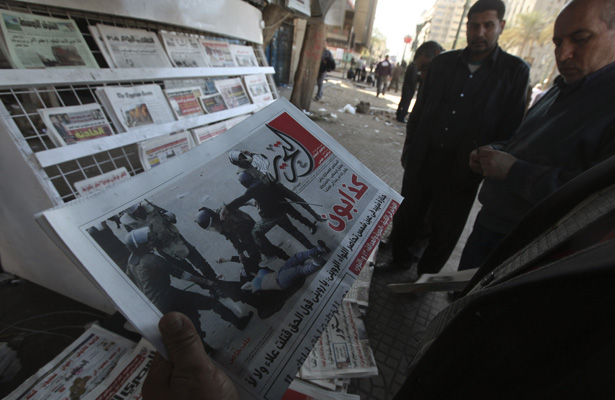The Triple Threat to Egyptian Press Freedom
A reader peruses the front cover of the revolutionary Tahrir newspaper (Photo: Amr Dalsh/Reuters)
[Originally published in The Atlantic.]
As the Arab uprisings continue, war and state repression aren’t the only threats to free expression. Egypt in the last week saw two other factors impinging on the independent media: bad finances and malignant bureaucracy. They pose a potent threat that could drastically worsen the dimming prospects for a transition away from authoritarianism.
The traditional print media’s business model has suffered all over the world, and Arab countries undergoing political transitions are not immune. Throw into the mix the fact that bloated state agencies control many of the major publishing conglomerates and television networks, and you have a gargantuan set of problems above and beyond efforts by the government to punish dissent and restrict speech (read my recent Internationalist column in The Boston Globe for more about Egyptian President Mohamed Morsi’s exertions on that front).
This week, the dismal economics of the print media nearly forced the closure of the Egypt Independent, one of the best sources of critical and feature reportage about Egypt. The editors were told this week that their paper, formerly known as Al Masry Al Youm English, would be closed because it loses too much money. They persuaded management to give them a stay of execution while they made their publication financially viable, but it seems only a matter of time before they face the prospect of closure again. (Another English-language paper, The Daily News Egypt, folded in 2012 although investors have since brought it back.)
Meanwhile, the dismal values of the Muslim Brotherhood’s media commissioners have driven out the editor of Al Ahram Online, an odd bright spot of breaking news and dissenting journalism that thrived, in English, within the otherwise moribund state publishing conglomerate. Ahram Online’s editor Hani Shukrallah is a secular leftist with Christian origins. He was forced into early retirement by the new Ahram supervisors put in place by the Muslim Brotherhood. Shukrallah believes it’s a purely political decision, and spoke out only after his salary was cut and his chosen successor passed over. “The object of course is humiliation,” he wrote in a Facebook note. “Fools! I have something immeasurably more precious: my dignity and self-respect. What do you have?” So far, his successor hasn’t been named and his staff continues its impressive work. A Muslim Brotherhood loyalist has already been put in charge of Ahram’s daily Arabic edition, and prospects don’t look good for the independent editorial line of Ahram Online in English.
The English-language local press served an important function before the uprisings that broke out two years ago. Its reporters had more leeway than the Arabic press, and pushed boundaries in their reporting on torture, corruption and incompetent governance. They have extended that role in the two years since Mubarak fell. Egypt Independent and Ahram Online are read by people all over the world, and by activists in Egypt as well. They shape opinions in the international policy community, and have been invaluable forums for Egyptians in Egypt and the diaspora.
Ahram Online might revert to regime control, but that’s not irreversible. It could be a temporary setback in a multi-year transition. If Egypt Independent closes, many of its talented journalists will have to seek employment elsewhere or leave journalism – but the publication could be resuscitated by an angel investor. This has all happened before, and unlike in Mubarak’s Egypt, there’s now a boisterous Arabic-language media that’s pushing the limits of oppressive state regulation. While there’s considerable pressure from the state, there’s also more limit-testing and more free speech than ever before.
Even before the financial woes that struck her paper, Egypt Independent editor-in-chief Lina Attalah was worried about the unprecedented amount of attention the new Muslim Brotherhood regime was paying to the English language press. “They’re concerned about their image abroad, and they do not yet own the state,” she told me. “So they feel they have to resort to other methods of control.”
Elsewhere in the region things there was grim news for free speech over the last week. Officials in Iraqi Kurdistan detained without warrant people who wrote critically about the government. An Australian outlet broke the news of a secret prisoner who died in Israeli custody in 2010, forcing the ridiculous spectacle of Israeli journalists, still facing prosecution if they talked about the gag order on the case, speculating about the case in the subjunctive. And in what passed for a bright spot Kuwaiti courts acquitted five online activists who had been charged with “offending the emir.”
All critics of the newly-elected Muslim Brotherhood government in Egypt face a concerted campaign by the presidency to shut them up. For journalists, there are two extra dangers: a bureaucracy with tentacles through much of the publishing and broadcasting industry, and a dangerously deflated economy that is bankrupting all kinds of businesses, including the media. It’s a potentially lethal triple threat, and it couldn’t come at worse time. There are plenty of scurrilous journalists-for-hire making up slanderous and polarizing stories, but the dedicated and courageous Egyptian press corps – not least including the staffs of Egypt Independent and Ahram Online – have provided inspiration and, crucially, information. Let’s hope they’re able to continue doing their jobs.


